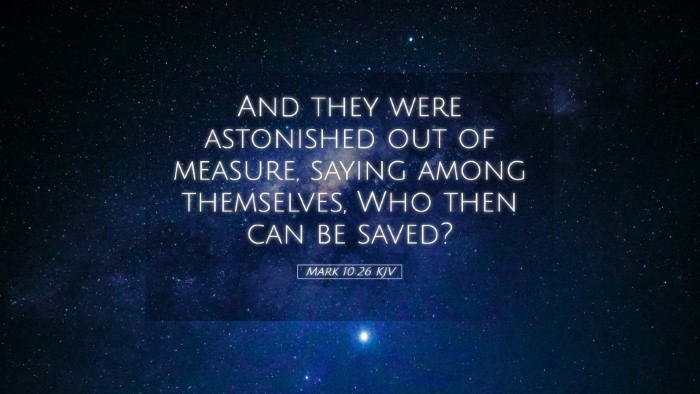Mark 10:26 - Biblical Commentary
Mark 10:26 records a powerful moment from the ministry of Jesus, where His teachings illuminate the tension between faith, wealth, and the Kingdom of God. The verse states:
"And they were astonished out of measure, saying among themselves, Who then can be saved?"
This reaction leads us to delve deeply into the implications of Jesus' message and the nature of salvation.
Contextual Background
The context of Mark 10:26 occurs after Jesus’ conversation with the rich young ruler, where He emphasizes the challenges for the wealthy to enter the Kingdom. Understanding the socio-economic dynamics of the first-century Jewish context is crucial for comprehending the astonishment of the disciples. Wealth was often seen as a sign of God’s favor, so Jesus’ radical message would have been shocking to them.
Insights from Commentators
To better understand this verse, we can reference insights from renowned public domain commentaries.
Matthew Henry's Commentary
Matthew Henry notes that the disciples’ astonishment indicates a significant misconception about wealth and spiritual status. They embraced the common belief that affluence equates to righteousness. Henry emphasizes how Jesus dismantles this belief, making it clear that divine grace, not human merit or resources, is the foundation of salvation. He states,
"It is not earthly treasures that will buy us a place in heaven, but the grace of God which saves us."
Albert Barnes' Notes on the Bible
Albert Barnes provides a thorough examination of the disciples’ astonishment. He highlights that their question, "Who then can be saved?", embodies a genuine confusion stemming from their cultural background. Barnes argues that Jesus’ words signify that the path to salvation is not within the reach of human endeavor, especially for those enveloped in worldly possessions. He writes,
"The difficulty is not merely in the riches but in the heart’s attachment to them."
Adam Clarke's Commentary
Adam Clarke delves into the theological implications of Jesus’ remark. He asserts that the verse challenges the reader to confront the idols of their heart, particularly when it comes to material wealth. Clarke posits that the Lord’s teachings shift the focus from human capability to divine ability. He states,
"If the rich are so prone to stumble, how much more shall those who rely on their own righteousness?"
Theological Reflections
The astonishment of the disciples invites a deeper reflection on the nature of faith, surrender, and the radical call to discipleship. The verse prompts believers to examine their own lives:
- Reevaluation of Wealth: Christians are called to consider how their resources might impact their relationship with God. Are they tools for ministry or obstacles to faith?
- Understanding Salvation: Salvation is a work of grace that transcends any worldly status. This universal need for grace underscores the inclusivity of the Gospel.
- Humility in Discipleship: Jesus calls for a humility that recognizes our dependence on God alone for salvation, regardless of social or economic standing.
Practical Applications
For pastors, students, and theologians, Mark 10:26 serves as a profound reminder of the transformative message of Christ:
- Preaching on Wealth: Pastoral teachings should address the dangers of materialism and encourage a lifestyle of generosity and stewardship, grounded in faith.
- Encouragement in Discipleship: Emphasize that discipleship involves relinquishing control over material possessions and fully trusting in God's provision.
- Engagement with the Community: Create programs that help individuals struggling with wealth distribution and emphasize community support and church involvement.
Conclusion
Mark 10:26 encapsulates a crucial teaching of Jesus about the nature of salvation and its apparent paradox regarding wealth. By combining insights from Matthew Henry, Albert Barnes, and Adam Clarke, we find a call to a deeper faith that values grace over riches and emphasis on the need for a heart-centered response to Christ’s invitation to discipleship. The astonishment of the disciples beckons every generation of believers to reconsider their own understanding of salvation as they navigate the complexities of wealth and spirituality.


